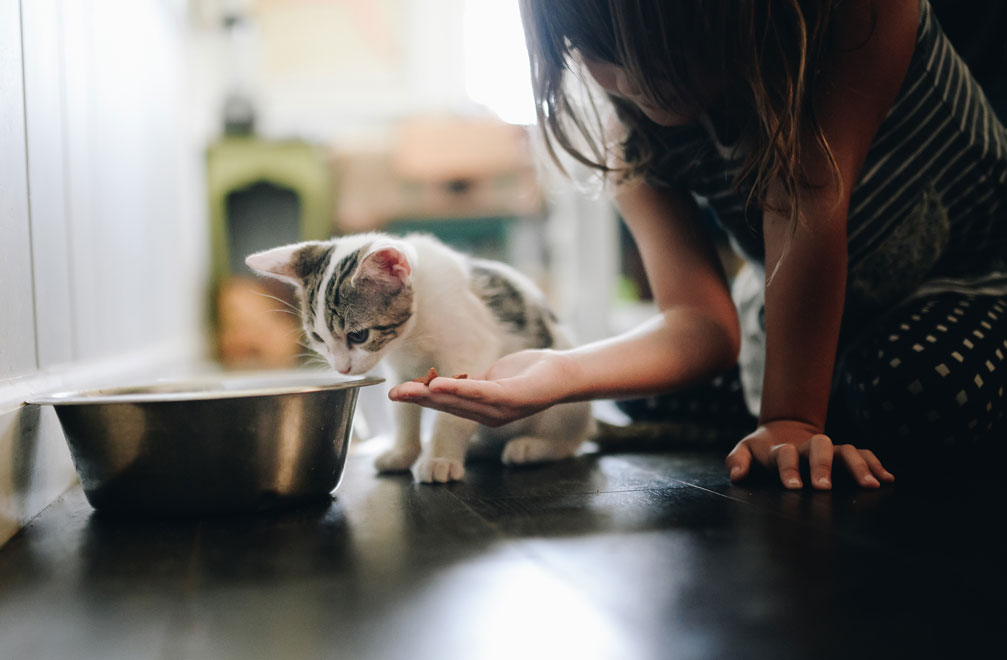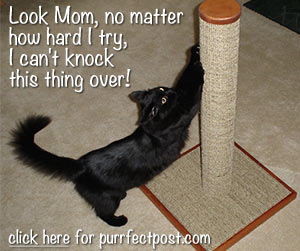General Feeding Info for Cats

One of the most important things you can do for your cat is to ensure that you're doing the best job of feeding that you can. While your veterinarian is the best source of information for deciding how much and what type of food your cat needs based on individual lifestyle and medical condition, here are some general things to keep in mind.
Dietary Needs of Cats
Cats are obligate carnivores. That means they must eat meat. They can eat other things too, but if they don't eat meat, they can't survive.
That's because of how they evolved. Cats' digestive tracts and systems are designed for meat, and their bodies can't make certain nutrients on their own. They must be present in the diet in the form of meat.
So, the first thing to keep in mind when feeding a cat is that they can't be a vegetarian or vegan.
Additionally, cats evolved originally in the desert. Because of that, their systems became adept at conserving water. In fact, most of a wild cat's moisture needs can be satisfied by eating prey. Cats' thirst drives are low, and that can be a problem for house cats, who don't get their water from prey and receive dry kibble for their diet. Those cats need to be coaxed to drink more water. A fountain can help (because cats in the wild evolved to be wary of stagnant water sources). Feeding canned or moistened food can more closely mimic a cat's natural way of feeding and getting water.
Because today's indoor cats don't always get enough water, they may be more prone to kidney disease.
Cats Like Odiferous Foods
Cats' feeding habits seem to connect directly to their sense of smell. The yummier a food smells to them, the better they'll eat it. That's why some picky feline eaters can be tempted by warming up their canned food to increase the odor. Adding some warm low sodium chicken broth can also help.
That is also the reason why cats that have an illness related to their nose, such as a respiratory tract infection that produces nostril-blocking snot, don't eat well. Cleaning off the nose blockage with a warm, wet cloth may help the kitty smell the food, and therefore, eat better.
Cats Don't Need Cow Milk
Cats are lactose intolerant once they reach about three months of age. Before that, cow's milk doesn't have everything they need, and after that, it may make them sick (and still doesn't have all the nutrients they need). While they may love it, cats don't need cow milk.
What About Raw Food Diets?
Domesticated cats are no longer well-suited to eating raw food diets. They may be susceptible to bacterial infections from doing so.
Are Home-Cooked Diets Good for Cats?
In some situations, homemade diets can be a good idea for a cat, especially if they have an allergy or other medical condition going on.
However, homemade diets must be prepared with extreme care, or the kitty may not get all the proper nutrients. The owner should always follow exactly a recipe created by a veterinary nutrition specialist, and the cat needs to be carefully monitored by a veterinarian.
So, What Should You Feed Your Cat?
A high-quality diet from a well-established commercial company is the safest bet for feeding your cat. Dry, moist, or semi-moist foods can be used, but clean, fresh water should always be available, and, as discussed above, cats receiving dry food should be especially well-monitored on their water consumption.
Additionally, make sure you're feeding the proper life stage diet for your cat. A kitten shouldn't be eating a senior diet, for example. Check with your veterinarian if you aren't sure which life stage your cat is in.
Some cats require prescription or special diets for particular medical conditions, and your vet is best suited to help you choose those.
How Often Should You Feed Your Cat?
In general, most cats do best when fed multiple small meals throughout the day. When cats are free fed, they are more likely to get too heavy.
Not only that, but you can use meal feeding as an opportunity to give your cat enrichment opportunities. Cats are hunters, so have your cat "hunt" his daily food by breaking it into small amounts and hiding each one. That will give him something to do while you're gone during the day and help satisfy his hunter instincts, which will help combat boredom and stress.
You May Also Like These Articles:
Can Cats Be Vegetarians or Vegans?
Should Cats Be Fed Meals or Free Choice?
Notice: Ask-a-Vet is an affiliated service for those who wish to speak with a veterinary professional about their pet's specific condition. Initially, a bot will ask questions to determine the general nature of your concern. Then, you will be transferred to a human. There is a charge for the service if you choose to connect to a veterinarian. Ask-a-Vet is not manned by the staff or owners of CatHealth.com, and the advice given should not delay or replace a visit to your veterinarian.






